Cite this document
(The Failure of the UN in Providing International Peace and Security after the Cold-War Period Essay Example | Topics and Well Written Essays - 3500 words, n.d.)
The Failure of the UN in Providing International Peace and Security after the Cold-War Period Essay Example | Topics and Well Written Essays - 3500 words. https://studentshare.org/politics/1825859-explain-the-failure-of-the-un-in-providing-international-peace-and-security-after-the-cold-war-period
The Failure of the UN in Providing International Peace and Security after the Cold-War Period Essay Example | Topics and Well Written Essays - 3500 words. https://studentshare.org/politics/1825859-explain-the-failure-of-the-un-in-providing-international-peace-and-security-after-the-cold-war-period
(The Failure of the UN in Providing International Peace and Security After the Cold-War Period Essay Example | Topics and Well Written Essays - 3500 Words)
The Failure of the UN in Providing International Peace and Security After the Cold-War Period Essay Example | Topics and Well Written Essays - 3500 Words. https://studentshare.org/politics/1825859-explain-the-failure-of-the-un-in-providing-international-peace-and-security-after-the-cold-war-period.
The Failure of the UN in Providing International Peace and Security After the Cold-War Period Essay Example | Topics and Well Written Essays - 3500 Words. https://studentshare.org/politics/1825859-explain-the-failure-of-the-un-in-providing-international-peace-and-security-after-the-cold-war-period.
“The Failure of the UN in Providing International Peace and Security After the Cold-War Period Essay Example | Topics and Well Written Essays - 3500 Words”. https://studentshare.org/politics/1825859-explain-the-failure-of-the-un-in-providing-international-peace-and-security-after-the-cold-war-period.


